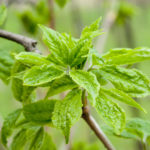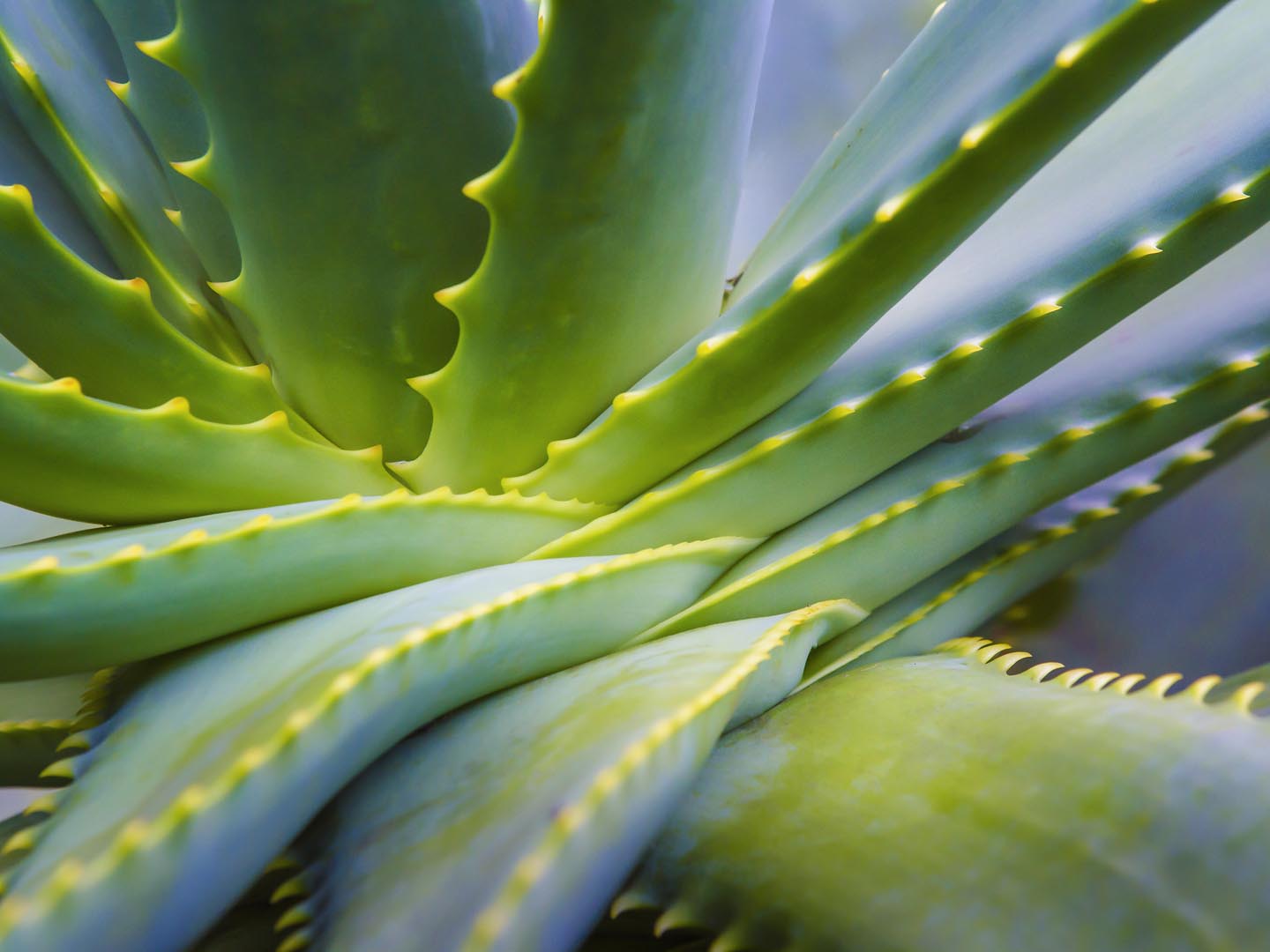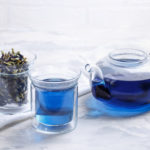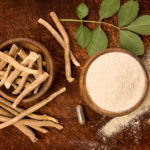Ashwagandha
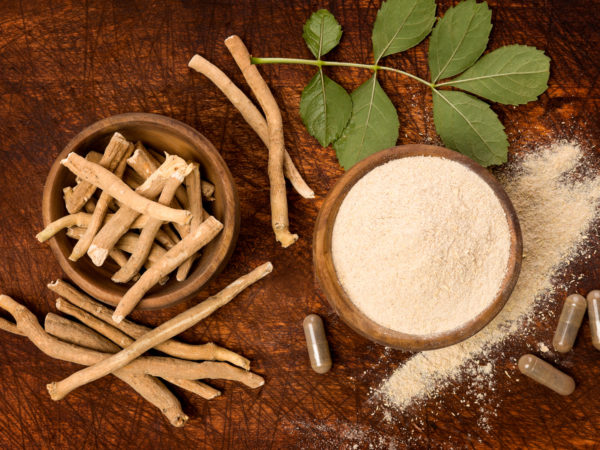
Ashwagandha (Withania somnifera)
Ashwagandha is a tonic herb with a variety of therapeutic uses. It is especially prized in the Ayurvedic herbal tradition and is commonly known as Indian ginseng, poison gooseberry, or winter cherry. Ashwagandha a perennial herb native to Southern Asia and is cultivated in the drier regions of Sri Lanka, Pakistan, and India. It features small, green flowers and fruit that is orange to red when ripe. A member of the Solanaceae family, or nightshade family, ashwagandha is related botanically to potatoes, pepper, and tomatoes.
Ashwagandha Is Used For:
Each part of the ashwagandha plant – the roots, leaves, and fruit – has been used in traditional Ayurvedic medicine for a variety of treatments. The leaves and fruit are applied externally to the skin to treat wounds, tumors, back pain, and carbuncles (cluster of boils). The tuberous ashwagandha root is most often used orally to help improve brain function and alertness, relieve stress and anxiety, and reduce pain and swelling. Ashwagandha is considered an adaptogen, a substance that enhances the body’s adaptive response to stress and balances normal body functions.
Animal studies have found constituents of the herb, including alkaloids, steroidal lactones, and saponins, to reduce inflammation and calm the nervous system. In one clinical trial of people with moderate to severe anxiety, researchers compared the effects of a mixture of 300 mg standardized to 1.5% withanolides, prepared from root, to psychotherapy. After the eight-week trial, the group that received the ashwagandha mixture had decreased anxiety and fatigue and increased concentration, compared to those who had psychotherapy.
The Natural Medicines Comprehensive Database found insufficient evidence to rate the effectiveness of ashwagandha for a variety of conditions including tumors, tuberculosis, liver problems, fibromyalgia, and infertility.
Ashwagandha Is Available In:
Ashwagandha is available in extract form in capsules as well as tea and powdered form.
Side Effects, Interactions And Warnings:
Ashwagandha may increase the sedative effects of benzodiazepines such as Valium, Ativan, Xanax, and other depressants. It may also interact immunosuppressant medications. Talk with your doctor before beginning a supplement regimen that includes ashwagandha.
Other Safety Concerns:
Pregnant women should avoid ashwagandha as it may affect hormone levels in the body, which could endanger a pregnancy. In animal studies, high dosages have been linked to toxicity, including impacts on thyroid function; however, human studies are limited.
When Buying Ashwagandha:
The supplements or tea should be packaged in light-resistant containers.
Ashwagandha Dosage:
Dr. Weil recommends 500 mg of an extract standardized to 2.5-5% with anolides. Ashwagandha dosage depends on several factors including your age and health history. Follow the dosage recommendations on the product.
Child Dosage:
Ashwagandha is not recommended for children.
Dr. Weil Says:
I recommend ashwagandha – along with other measures – for the treatment of insomnia when stress is a contributing factor. If this is an issue for you, try to stick to a routine at bedtime – go to bed at the same time every day, avoid caffeine and get plenty of exercise during the day. A dark room free of noise may also help. If you are having trouble falling asleep, try relaxation techniques like breathing exercises, meditation, or yoga. I also recommend ashwagandha as a natural way to fight fatigue and boost energy levels, as well as a treatment for pain, skin diseases, diabetes, gastrointestinal disease, rheumatoid arthritis, and epilepsy.
SOURCES:
al-Hindawi MK, al-Khafaji SH, Abdul-Nabi MH. Anti–granuloma activity of Iraqi Withania somnifera. J Ethnopharmacol. Sep 1992;37(2):113-116.Anwer T, Sharma M, Pillai KK, et al. Effect of Withania somnifera on insulin sensitivity in non-insulin-dependent diabetes mellitus rats. Basic Clin Pharmacol Toxicol. Jun 2008;102(6):498-503.
Ashwagandha. Natural Medicines Comprehensive Database Consumer Version. Stockton, CA: Therapeutic Research Faculty, Updated June 30, 2011, accessed January 8, 2014, at naturaldatabaseconsumer.therapeuticresearch.com/
ConsumerLab – consumerlab.com/tnp.asp?chunkiid=21532#ref5 – accessed 6-19-2016
Cooley, Kieran, Orest Szczurko, Dan Perri, Edward J. Mills, Bob Bernhardt, Qi Zhou, and Dugald Seely. “Naturopathic care for anxiety: a randomized controlled trial ISRCTN78958974.” PloS one 4, no. 8 (2009): e6628.
Jayaprakasam B, Zhang Y, Seeram NP, et al. Growth inhibition of human tumor cell lines by withanolides from Withania somnifera leaves. Life Sci. Nov 21 2003;74(1):125-132.
Mishra, Lakshmi-Chandra, Betsy B. Singh, and Simon Dagenais. “Scientific basis for the therapeutic use of Withania somnifera (ashwagandha): a review.” Alternative Medicine Review 5, no. 4 (2000): 334-346.
Panda S, Kar A. Changes in thyroid hormone concentrations after administration of ashwagandha root extract to adult male mice. The Journal of pharmacy and pharmacology 50, no. 9 (1998):1065-1068.
Reviewed by Russell Greenfield, M.D., August, 2016.



